Tea tree oil is an essential oil extract from a tree native to Australia which is used as an herbal treatment for everything from cold sores to acne to skin inflammation.
It’s usually applied directly to your skin, usually (but not always) diluted with a carrier oil like jojoba oil or olive oil.
Our research team set out to review and rank the best tea tree oil supplements on the market, and came up with these rankings of the highest-quality tea tree oils.
Research
Rankings
1. Eve Hansen Tea Tree Oil
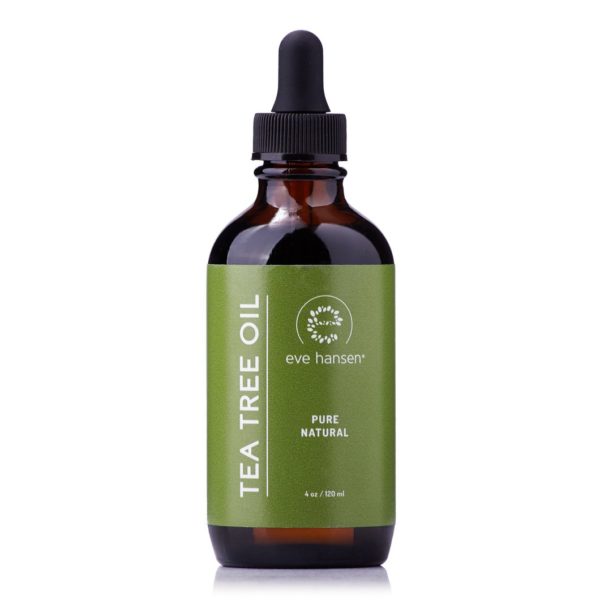
Eve Hansen Tea Tree Oil, like many other tea tree oils on this list, is 100% pure and steam distilled, but what sets it apart is its organic certification.
With that, you can be sure that there are no traces of pesticides or synthetic fertilizers that make their way into the solution, which makes this an excellent choice for aromatherapy.
The four fluid ounce size also makes this tea tree oil well suited for topical users, even if you are treating a large area of your body on a daily basis.
2. Handcraft Blends Tea Tree Essential Oil
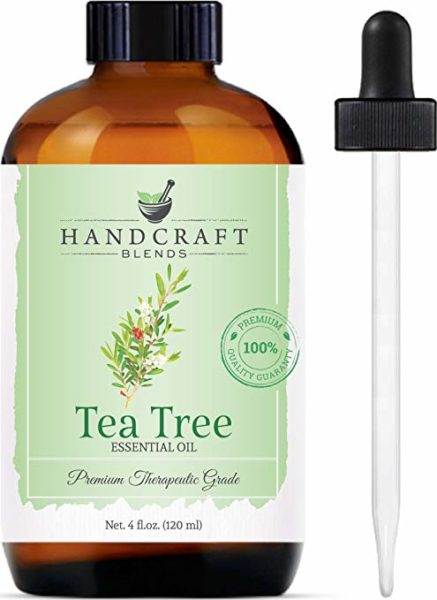
Handcraft Blends Tea Tree Essential Oil is a pure and well-designed tea tree oil that comes in a large four-ounce bottle, making it a good choice for people who use tea tree oil frequently.
If you apply it to large swaths of skin or scalp, or have multiple uses for tea tree oil, this is a good option.
3. Now Essential Oils 100% Pure Tea Tree
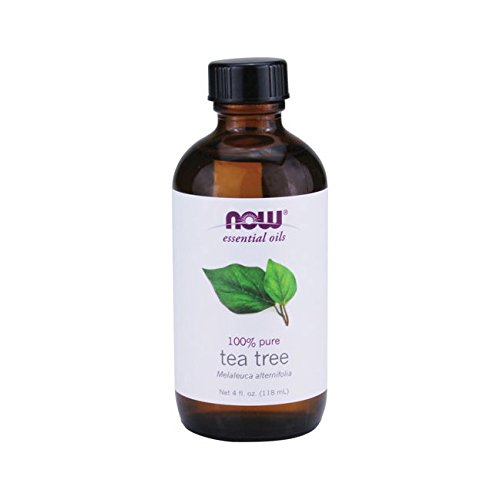
Now excels when it comes to simple and straightforward herbal products, and their tea tree oil is no exception. It’s 100% pure and comes in a large four ounce bottle, making it good for frequent users of tea tree oil.
4. Maple Holistics Tea Tree Essential Oil
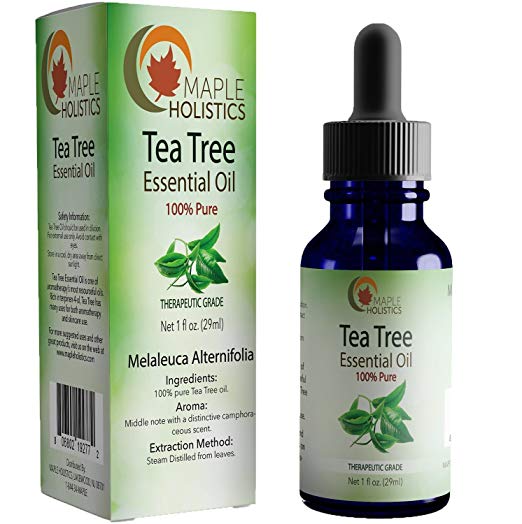
Maple Holistics Tea Tree Essential Oil is a tea tree oil that’s particularly popular for its antifungal properties. Users find it especially helpful for nail and scalp conditions, and like many other tea tree oils on this list, it’s a 100% pure steam-distilled essential oil, which makes it an excellent overall pick.
5. Artizen Essential Oils Tea Tree
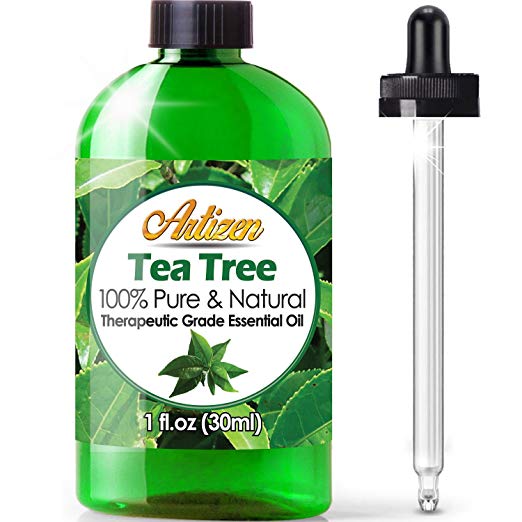
Artizen Essential Oils Tea Tree is designed specially for aromatherapy, but since it’s a highly pure steam-distilled tea tree oil, it will work well for topical applications as well.
Each bottle contains one ounce of liquid, which is good but not great when it comes to quantity.
6. Pure Body Naturals Tea Tree Essential Oil
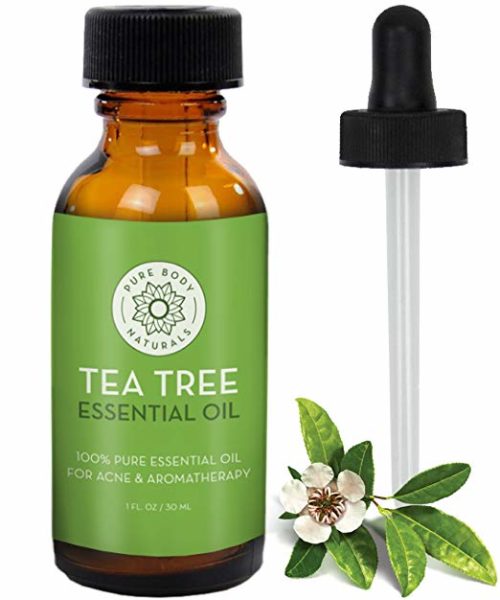
Pure Body Naturals Tea Tree Essential Oil is a pretty good tea tree oil, derived from steam distillation, that comes in a one ounce bottle.
Without any particular features to distinguish it from its competitors, though, it’s hard to rank this product any higher.
7. First Botany Cosmeceuticals Australian Tea Tree Essential Oil
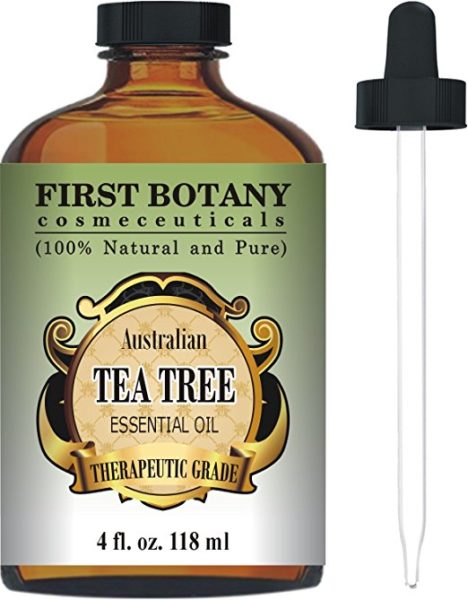
First Botany makes a tea tree oil that the company claims is higher than competitors in a compound called terpinen, which is thought to be at least one of the active compounds in tea tree oil that is responsible for its efficacy.
However, First Botany supplies no data to back up this claim, so it’s hard to take this claim at face value.
8. Healing Solutions Tea Tree Oil
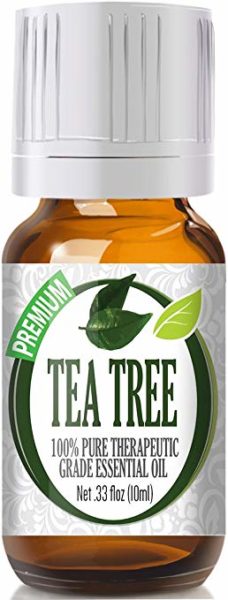
Healing Solutions Tea Tree Oil is a highly pure tea tree oil that’s subjected to stringent quality standards.
It’s well-loved by users for its ability to clear up skin conditions and facial redness, and people report very few problems with it. The only drawback is the fairly small bottle size of 10 mL.
9. Plant Therapy Organic Tea Tree Oil
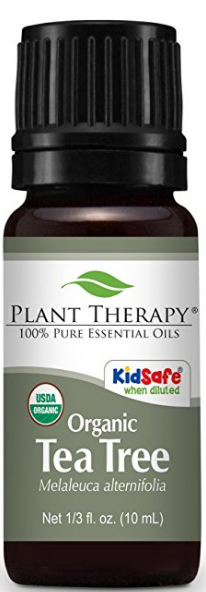
Plant Therapy Organic Tea Tree Oil is another tea tree oil that sports an organic certification, and the oil is pure and of high quality.
However, the small bottle size (only one third of an ounce) will make this a poor choice for frequent or high volume users.
10. Hollywood Beauty Tea Tree Oil
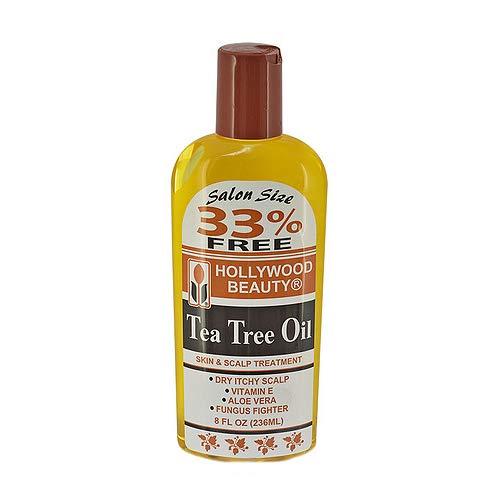
Hollywood Beauty Tea Tree Oil makes a popular tea tree oil, but it’s dispensed in a large and pretty haphazard plastic bottle that may not protect the delicate organic compounds in the tea tree oil from being damaged by exposure to light.
Category winners
Best tea tree oil overall: Eve Hansen Tea Tree Oil
Eve Hansen takes our top spot overall thanks to its incredible purity, minimal processing, and most of all, its organic certification. For products you’ll be applying to your skin or scalp on a regular basis, you want something that’s free of contaminants, and Eve Hansen fits this requirement perfectly.
Best tea tree oil for acne: Eve Hansen Tea Tree Oil
Tea tree oil contains potent antibacterial capabilities, which makes it a strong natural remedy for treating acne, which is essentially a localized skin infection. Applying Eve Hansen Tea Tree Oil directly to an inflamed pore is a great natural way to treat acne.
Best tea tree oil for hair: Handcraft Blends Tea Tree Essential Oil
Handcraft Blends makes a great tea tree oil for dry hair and irritated scalp. The large four-ounce bottle means you won’t run out of tea tree oil anytime soon, and the eyedropper makes it easy to apply precisely to scalp and hair roots.
Best tea tree oil for skin: Eve Hansen Tea Tree Oil
While being a strong pick for acne, Eve Hansen is also our favorite when it comes to general-purpose skin treatment. Whether it’s dryness and irritation or redness and pain, Eve Hansen is great on its own or diluted with a high-quality oil like jojoba or olive oil.
Best tea tree oil for dandruff: Handcraft Blends Tea Tree Essential Oil
Is itchy, scaly, and dry scalp driving you crazy? Handcraft Blends is a solid pick for attacking dandruff at its source, whether it’s caused by fungus or by irritation and inflammation. Its purity and large size makes it our pick for dandruff.
Best tea tree oil for cold sores: Eve Hansen Tea Tree Oil
Tea tree oil is a proven remedy for cold sores, and on this front, Eve Hansen is our recommendation. For something that’s going on your lips on a regular basis, purity matters, and Eve Hansen’s organic certification is ideal for this reason.
Who should buy tea tree oil?
Tea tree oil is great for all individuals looking to reduce acne, treat cold sores, and calm down skin inflammation. It is also helpful to treat fungal infections in the toenails and scalp.
Pregnant women and children can take tea tree oil but only under the supervision of doctors.
How we ranked
Hollywood Beauty Tea Tree Oil comes in a plastic bottle that doesn’t protect against light oxidation, which is why it ranked it last. Plant Therapy offers a great tea tree oil but comes in a very small bottle, making it a poor choice for frequent users. Healing Solutions provides a good quality tea tree oil in a small bottle, which can be annoying for people who use it a lot – which is why it ranked near the bottom.
Pure Body Naturals offers a high-quality tea tree oil that is sourced using steam distillation to ensure purity. However, it’s pretty simplistic and doesn’t offer anything special, which is why it ranked in the middle of the pack. Maple Holistics Tea Tree Oil is 100% steam-distilled to ensure purity. Reviews continuously state that it is amazing for nail and scalp conditions, which is why it ranked in our top 5. Now provides a great large volume tea tree oil that is free of chemicals and impurities. It ranked 3rd for its commitment to purity and simplicity.
Handcraft Blends Tea Tree Essential Oil comes in a large dark bottle to protect against light oxidation. eIt’s large bottle is great for people who use a lot of it. It’s fair price, and good quality made it our number 2 pick. Eve Hansen provides one of the only certified-organic, 100% steam-distilled tea tree oils on the market. This not only allows for maximum bioavailability but also limits the number of trace pesticides that would normally find its way into the solution. It also comes in a large, dark glass bottle to protect against oxidation, which is why we ranked it #1.
Benefits
Tea tree oil can be used as a treatment for cold sores. Cold sores are painful and often embarrassing spots of inflammation and swelling on the lips that are caused by a virus.
Some people who contract the virus experience recurrent cold sores throughout their life, especially during periods of stress or conditions that lower the functioning of their immune system.
Tea tree oil has long been a folk remedy for cold sores, but recent scientific research has started to shed light onto its role in fighting the virus that causes cold sores.
Initial research focused on studying the antiviral activity of tea tree oil against viruses on petri dishes. A study published in 2001 in the journal Die Pharmazie investigated the effects of different concentrations of tea tree oil against the herpes simplex virus, which is the one responsible for cold sores (1).
Even at very low concentrations, the tea tree oil inhibited the activity of the virus. Discoveries like this led to small-scale pilot studies using tea tree oil in people with chronic cold sores, such as one study published in the Journal of Antimicrobial Chemotherapy (2).
This pilot study assigned 20 people to either apply a 6% tea tree oil gel daily, or a placebo gel that contained no tea tree oil.
Though the trial was quite small, and one subject had to withdraw because of irritation caused by the tea tree oil, the researchers found that the people who received the tea tree oil fared better than those who did not.
They were less likely to get a cold sore during the study’s follow-up period, and those who did recovered more quickly, though (possibly because of the very small sample size) these effects did not rise to the level of statistical significance.
The results of this trial combined with the multiple strands of evidence showing a direct effect of tea tree oil against the herpes simplex virus suggest that tea tree oil could be a very useful cold sore treatment, and does not need to be applied full-strength to be effective.
Tea tree oil can be used to reduce acne. Since tea tree oil is an effective antimicrobial against the herpes simplex virus, researchers wondered if it could have similar antimicrobial properties against the kind of bacteria that contribute to acne.
Again, herbal and folk use long presaged modern clinical trials into the efficacy of tea tree oil to treat acne, but modern research provides the strongest insights into its potential.
One clinical trial published in 2007 in the Indian Journal of Dermatology, Venereology and Leprology used a group of 60 people divided evenly into an experimental group and a control group (3).
The experimental group applied a tea tree oil product to their face on a daily basis, while the control applied a placebo gel.
The experiment lasted 45 days, during which the subjects were followed up every 15 days. WHen the researchers compared the experimental group to the placebo group, they found that the incidence of new acne marks decreased significantly in those who were using tea tree oil.
The acne marks that did occur were judged to be less severe, on average, in the group using tea tree oil. A different study conducted by researchers in Australia compared tea tree oil to benzoyl peroxide, one of the standard heavy-hitting anti-acne treatments (4).
The study used 124 patients who were randomly assigned either a 5% tea tree oil gel or a benzoyl peroxide gel. The results showed that the treatments were similarly effective, although the tea tree oil treatment took longer to start working.
The patients who received tea tree oil scored slightly worse on an index for skin oiliness, which would make sense given the oily nature of tea tree oil.
On the other hand, the tea tree oil experienced fewer side effects than the benzoyl peroxide group.
This means that tea tree oil could be an especially useful acne treatment for people who have not had success with benzoyl peroxide because of its tendency to cause redness, scaling, and other undesirable skin side effects.
Tea tree oil can be used to treat fungal infections of the toe nails and scalp. A clinical trial published in 1994 compared tea tree oil to one of the standard antifungal agents used to treat onychomycosis, the medical term for a fungal infection of the nails (5).
The six month long study used two groups of equal size, and randomly assigned the subjects to either the traditional medical treatment or the tea tree oil treatment. Unlike other studies on acne and cold sores, this study used full-strength, 100% pure tea tree oil.
The results showed that the tea tree oil and the traditional antifungal cream were equally effective. Though not all patients were cured, none experienced side effects that were enough of a problem to discontinue the protocol.
Though this study did not directly explore the mechanism behind how the tea tree oil helped fight off the fungal infection, the evidence we’ve already seen suggests that it is because tea tree oil has broad-spectrum antiviral, antibacterial, and antifungal activity.
With regards to its use in other fungal conditions, a review article published in 2006 in the journal Clinical Microbiology Reviews notes a number of studies showing efficacious use of tea tree oil in treating dandruff-causing fungal infections of the scalp, though at a 5% concentration as opposed to full strength (6).
Side effects
As with any plant-derived essential oil, one potential side effect with tea tree oil is an allergic reaction. It’s wise to test tea tree oil in a low concentration in a small area first.
The risk of developing an allergic reaction is reduced if you use a dilute solution, according to researchers in Australia who authored a review article on tea tree oil (7).
In addition to the potential for allergic reactions, some people develop redness, irritation, and mild inflammation. Despite these adverse effects, tea tree oil typically fares better when it comes to side effects than traditional treatments.
Acne is a good example: though tea tree oil takes longer to start working, it is associated with a reduced risk of adverse effects compared to the usual treatments.
Recommended dose
When it comes to using tea tree oil to treat cold sores, acne, or fungal infections, dosage really comes down to concentration.
For treating acne, cold sores, and the scalp, most studies use tea tree oil diluted to 4-6% concentration using some type of carrier oil or gel.
You don’t need to get fancy with this; something pure and natural, like jojoba oil or even olive oil, will work just fine.
For fungal infections in your nails, though, you shouldn’t dilute the tea tree oil at all: apply it full-strength to the affected area, twice per day.
FAQ
Where is tea tree oil derived? Tea tree oil is a popular natural remedy for everything from acne to nail fungus to skin inflammation. It’s also used quite often as a cold sore treatment and as a key essential oil for aromatherapy.
It’s derived by steam distillation of the raw plant material of the tea tree, which is native to Australia. The result is a highly concentrated and highly pure herbal liquid that’s useful for a wide variety of conditions—tea tree oil.
Does tea tree oil help treat athlete’s foot? Yes, tea tree oil can help treat athlete’s foot. Athlete’s foot is a fungal infection, usually beginning in between the toes, which causes a rash that is itchy and causes a burning sensation. A 1992 study showed that tea tree oil helped improve athlete’s foot symptoms significantly (8).
Does tea tree oil help with dandruff? Yes, tea tree oil has been shown to improve dandruff. In a 2002 study, 26 patients were randomly assigned to be treated with tea tree oil or a placebo for their dandruff. At the end of the study, the group using tea tree oil saw a 41% improvement compared to the 11% improvement of the placebo group. Tea tree oil users also reports less greasy hair as well as itchiness (9).
Can you put tea tree oil directly on your skin? Yes, tea tree oil can be used directly on the skin and is the most common way to use tea tree oil for health benefits. With that said, you should be adding tea tree oil to creams, gels, and other liquids before using them directly on the skin as using undiluted tea tree oil can cause irritation. By applying diluted tea tree oil products to your skin, you can effectively reduce oil, dryness, and even scaling of the skin. This makes tea tree oil perfect for conditions like acne, eczema, and dermatitis.
Is it good to put tea tree oil on pimples? When you combine tea tree oil with facial moisturizers or face creams, it can help reduce facial acne. That’s because tea tree oil is capable of decreasing the amount of oil clogged in your pores. Tea tree oil can also prevent skin dryness. This is what sets tea tree oil products apart from typical products, as most acne treatments will dry out the skin and cause flaking.
What is tea tree oil good for? Because of the anti-inflammatory and antimicrobial characteristics of tea tree oil, these products can essentially be used for any skin condition.
This includes reducing skin dryness and oil, unclogging the pores, and even reducing bacteria in the mouth when combined with a mouthwash product. With its antiseptic features, tea tree oil can be used on cuts, abrasions, and other open wounds to reduce wound infections and promote the healing process.
In addition to improving your skin’s appearance, you can use tea tree oil to alleviate allergic reactions and directly treat open wounds and skin infections (10).
What is tea tree oil? Tea tree oil has been used as a skincare and healthcare product in Australia for over 100 years. The oil itself comes directly from the Melaleuca alternifolia, a small Australian tree in the myrtle family.
Since its initial discovery, tea tree oil has been used to promote skin health, reduce the spread of bacteria and viruses, and treat skin infections.
Can tea tree oil help treat warts? Yes, tea tree oil can help treat warts. Warts are non-dangerous skin growths can that can be painful and ugly. One study showed that tea tree oil helped remove warts in pediatric patients within 12 days of treatment (11).
How should I dilute tea tree oil? Anytime you use tea tree oil in your skincare routine, you need to make sure that you’re diluting it. You can dilute tea tree oil with water, witch hazel, creams, gels, and moisturizers.
If you’re looking for a more intense effect, you should use a larger amount of tea tree oil. For maximum dilution, you could use a few drops of tea tree oil with about 100 milliliters of water. Remember that tea tree oil can be toxic in large amounts and can lead to skin irritation if you have sensitive skin.
How effective is tea tree oil on an open wound? If it’s a minor wound, tea tree oil can help to remove bacteria from the wound when mixed with an ointment or cream. This can promote healing and reduce scarring.
When it comes to major open wounds, it can be risky to use tea tree oil rather than pursuing medical attention.
How can tea tree oil be used on hair? Tea tree oil has already proven effective in preventing hair loss, encouraging hair growth, and reducing dandruff.
Most of the benefits are related to the scalp rather than the hair itself since a healthy scalp leads to healthy hair. To get the best results, you should mix a few drops of tea tree oil with a haircare product and then apply it directly to your scalp.
Does tea tree oil help with gum disease? Yes, tea tree oil can help treat chronic periodontitis, which is a gum disease that destroys the bones and soft tissue that support the teeth. According to a 2013 study , tea tree oil can reduce inflammation and promote the healing of periodontal tissues (12).
Can tea tree essential oil be used in bathwater? Tea tree oil can be used directly in the bath. To get the most out of the product without causing irritation, you should only use a few drops mixed with the bathwater. When you take a bath with water that’s infused with tea tree oil, you’re boosting your skin health by killing off lingering bacteria.
Additionally, you can use a tea tree oil bath to treat any current skin infections, as well as reduce the symptoms of skin conditions like eczema and psoriasis. You can also combine tea tree oil with your body wash or face wash for more powerful effects.
Is tea tree oil harmful? Like any other supplement, tea tree oil has its limitations. In particular, there is a greater risk of toxicity when consumed orally and used in larger amounts.
Topically, there are usually no concerns related to tea tree oil unless you have sensitive skin, in which case you might notice skin irritation after repeated use. Topical use may also cause an allergic reaction. Tea tree oil is deadly to pets, and you should not expose them to it under any circumstance (13).
Is it safe to ingest tea tree oil? Tea tree oil can be toxic and is not safe to ingest. That said, it can provide some benefits when used in mouthwash, both for treating oral infections and promoting healing.
Is it safe to inhale tea tree oil? In moderation, yes, it’s safe to dilute a few drops of tea tree oil in water and put it in a diffuser. However, extended exposure can cause unfavorable side effects like nausea and headache.
Can I buy unscented tea tree oil? Unfortunately, the scent is an intrinsic part of the oil and cannot be removed. The best way to reduce the odor is to mix the oil with a scented product or dilute it.
Does tea tree oil speed up wound healing? Due to the anti-inflammatory, immunomodulatory, and antimicrobial activities of tea tree oil, it’s possible that tea tree oil can speed op wound healing. In one study, tea tree oil showed to decrease healing time in every participant but one (14).
Does tea tree oil expire? Tea tree oil usually has an expiration date a few years, but the exact shelf life depends on whether the tea tree oil is infused with another oil or substance. Since you’re not ingesting it, using expired tea tree oil isn’t harmful. It just may not be as effective as fresh oil, and you might need to use more of it to get the same benefits. To get the longest possible shelf life, store your tea tree oil in a cool, dark place.
Where can you buy tea tree oil? Since tea tree oil has become mainstream, it’s available in many locations, including most pharmacies, health food stores, and even in some grocery stores that sell nutritional supplements. It’s also sold in some stores that sell diffusers.
In addition to being sold as a standalone product, tea tree oil is often found as an ingredient in manufactured skincare products.
Can you use tea tree oil on your face? Yes, tea tree oil is safe on all areas of your skin, including your face. You should dilute the tea tree oil as it can cause adverse side effects in some individuals who are sensitive.
Can tea tree oil treat gingivitis? Yes, tea tree oil can treat gingivitis due to the anti-inflammatory properties it possesses. Gingivitis is a gum disease that occurs when plaque builds up on teeth and causes the inflammation of the surrounding gum tissue.
A 2017 study showed that tea tree oil provided the greatest improvement in inflammation and bleeding associated with gingivitis when compared to other types of mouthwash (15).
Related articles
Recap
Tea tree oil is an herbal compound that boasts a wide range of antimicrobial properties.
Its antiviral abilities make it a good cold sore treatment, while its antibacterial properties help fight against acne. Further, the antifungal properties of tea tree oil can help you defeat toenail and scalp fungal infections for good.
In most cases, you should dilute tea tree oil with something like olive oil or jojoba oil, but you should apply it full strength for treating toenail fungal infections.
Always test a small area with a dilute concentration first to make sure you aren’t allergic to tea tree oil.
When used correctly, tea tree oil is a great all-natural treatment for a broad range of skin and nail conditions.
For BodyNutrition’s #1 ranked tea tree oil, click here.